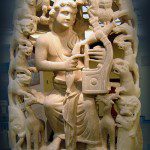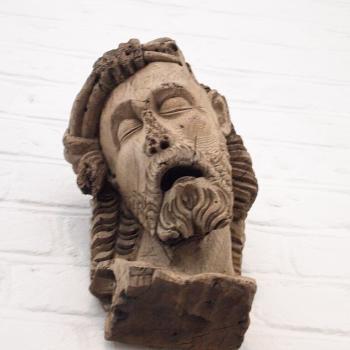It is important to see, then, that original sin is not actual sin, and the condition we find ourselves in thanks to original sin is not, in and of itself, a sinful condition. It is a weakness, an evolutionary change in our being, so that we are more accustomed to the material than the spiritual realm. We allow our body and its impulses guide us because it is directly attached to the form of existence we are most accustomed to experience. Our body is not evil, its impulses and desires which lead us to temptation must not be understood as evil; it is, however, imbalanced. That imbalance will make us topple over and fall down, as it were, again and again, until we restore the balance with a spiritual vision, with an ability to perceive the spiritual realm and integrate it with our material senses, uniting the two together in holistic unity. Our weakness, our desires, our temptations are not sins, and our blindness is itself not a sin nor a result of any sin. With Christ, the spiritual senses can be restored, the original integrity of the human person, our original face, can be known and through it, we will see and experience the world in the fullness of our being, in body and spirit. Christ, it is said, used clay to help restore the blind man to show it is in and through the body that the spiritual senses are to be found, that we must not disconnect ourselves from the material form of existence, but work with it, bringing the clay of the flesh into proper order.
When the blind man finds his vision restored, he saw the world and all its glories in the way we should see and engage the spiritual world once it is revealed to us. It is a thing of surprise and mystery. As the blind man being healed by Jesus was brought face to face with Christ, so we, upon being healed by Christ, will be able to encounter the risen Lord, to see and know him in and through our spiritual senses, so that coming upon him we will believe and worship him like the blind man:
Jesus heard that they had cast him out, and having found him he said, “Do you believe in the Son of man?” He answered, “And who is he, sir, that I may believe in him?” Jesus said to him, “You have seen him, and it is he who speaks to you.” He said, “Lord, I believe”; and he worshiped him (Jn. 9:35-38 RSV).
![Cathedral Church of Saint Patrick (Charlotte, North Carolina) - stained glass, Christ heals a blind man by Nheyob (Own work) [CC BY-SA 4.0 (http://creativecommons.org/licenses/by-sa/4.0)], via Wikimedia Commons](https://wp-media.patheos.com/blogs/sites/637/2017/05/Cathedral_Church_of_Saint_Patrick_Charlotte_North_Carolina_-_stained_glass_Christ_heals_a_blind_man-214x300.jpg)
He said not, “I am He that healed you, that bade you, Go, wash in Siloam”; but keeping silence on all these points, He says, “Dost thou believe in the Son of God?” and then the man, showing his great earnestness, straightway worshipped; which few of those who were healed had done; as, for instance, the lepers, and some others; by this act declaring His divine power. For that no one might think that what had been said by him was a mere expression, he added also the deed.[1]
Here, then, we are shown that some who come to Jesus to be healed still put something between themselves and Jesus so as not to be entirely enlightened by him. They are thankful, but their minds are not yet enlightened; they are given strength and a sense of freedom, but their insight is not yet there. Only those who have open themselves up to the light of the world, the light which enlightens the mind it touches, will grasp after who Jesus is and worship him.
If and when we see the risen Lord, we encounter him in our spirit. The light shines bright upon us, though Jesus understands the healing process, so he light, however bright, will at first be dimmed so that we can adjust to it, and then once we are, we will receive more and more of the light, going from glory to glory, light to light. Each time, we will find the spiritual light blinding us through its brightness, but it will be a different kind of darkness, the bright darkness of God instead of the darkness of sin. The latter leaves us unable to see, always in the dark, while the light of Christ brings us into glory – we see it, we cringe, we hold back, we adjust, we draw closer to him, each time finding ourselves overwhelmed by the greater and greater light of Christ, a light which is so bright it blinds and brings us into a great darkness where the higher, transcendent glory of God is to be experienced. We are not cut off from God, our spiritual senses are not lost, but only made stronger, allowing is to see and experience more and more as we encounter the true light of God’s glory. We must be open to it to allow the adjustment take place.
The blind man had to wash his eyes, just as we have to be washed in baptism and enlightened by the Spirit in baptism and confirmation – but then he could see and saw Christ, and we, if we look with spiritual eyes, can slowly see Christ all around us, the Logos reflected in all things. All things can speak of Christ, for they are patterned from the Logos, and so are said to be logoi of the Logos. As we adjust to our new, greater condition, we can see how all things come together and reveal how their foundation lies in Christ, and so reveal Christ at the heart of creation itself.
We believe, we have faith, we become healed and then we see – only to then be taken further, deeper into the spiritual realm, fighting for greater vision, further light, greater healing, as we purify ourselves from sin, cataracts which hinder our spiritual sight. Whatever sin which continues to hinder our spiritual perception requires us to repent so that we can have its taint removed from our vision; thus, we sing:
I come to You, O Christ, / Blind from birth in my spiritual eyes / And I call to You in repentance: / You are the most radiant light of those in darkness! (Kontakion Sunday of the Man Born Blind).
Having been healed by Christ, let us be thankful; let us grow in grace, so that we can grow in our ability to take in the light of truth and be further enlightened by it. Let us follow the example of the blind man and not those who left Christ after being healed, as St. Caesarius of Arles exhorted us:
Now, beloved brethren, since we in Christ have recovered the eyes of the heart which we had lost in Adam, let us give abundant thanks to Him who deigned to enlighten us to behold Him, without any preceding merits on our part. Let us endeavor, with as much strength as we can and with His help, to open our eyes to the good and close them to evil, according to what the prophet begs of the Lord when he says: ‘Turn away my eyes from what is vain.’[2]
It is not because of some personal demerits which led us to be born spiritually blind, and it is not our merits which opens our spiritual senses and allows us to holistically engage the world. It is grace which heals us, body and soul, and so with grace we must go, cooperating with its power. Through such grace we can see what is truly good and evil, and so turn away from the ugliness which is evil by following the good which naturally attracts us with its beauty.
[1] St. John Chrysostom, Homily 59 on John in NPNF1(14): 212.
[2] St. Caesarius of Arles, Sermon 172 in St. Caesarius of Arles: Sermons 81 – 186. Trans. Mary Magdalene Mueller, OSF (Washington, DC: Catholic University of America Press, 1963), 427.
Stay in touch! Like A Little Bit of Nothing on Facebook:
A Little Bit of Nothing













